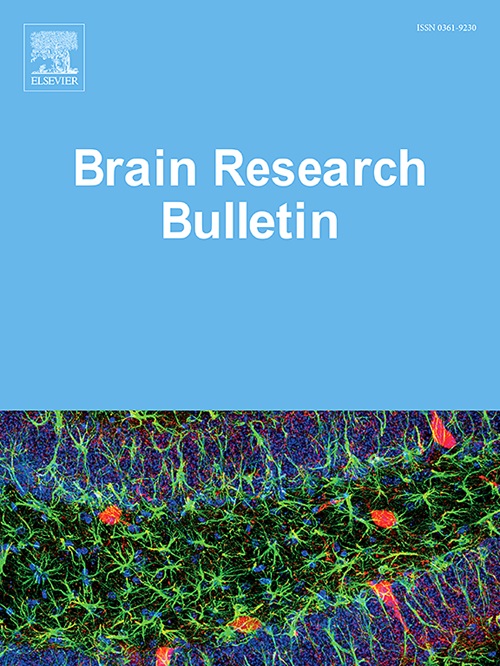Lipoxin A4 suppresses neutrophil extracellular traps formation through the FPR2-dependent regulation of METTL3 in ischemic stroke
IF 3.7
3区 医学
Q2 NEUROSCIENCES
引用次数: 0
Abstract
Background
This study aimed to clarify whether the neuroprotective effect of LXA4 is associated with the targeting of neutrophil extracellular traps (NETs) in ischemic stroke (IS).
Methods
The MCAO rat model was established to assess cerebral infarction, brain water content and neurological deficits. ELISA was employed to examine the activities of MPO, NE, MMP-9. RT-qPCR and western blot was performed to analyze molecular expressions. A luciferase reporter assay was performed to measure the effect of EGR1 on the METTL3 promoter. The formation of NETs and cell viability were evaluated using immunofluorescence staining and CCK8 assay, respectively.
Results
LXA4 decreased cerebral infarction and brain water content, improved neurological deficits, and reduced the release of NETs-associated indicators (MPO, NE) in MCAO rats. LXA4 reduced NETs formation, MPO and NE levels in vitro. In addition, LXA4 reduced Fe2 + levels while increasing GPX4, SLC7A11 protein expressions, as well as enhancing cell viability in vitro, suggesting the inhibitory effect of LXA4 on ferroptosis. Notably, METTL3 overexpression produced the opposite effects. Furthermore, the effects of METTL3 overexpression on NETs formation and ferroptosis were partially reversed by LXA4 treatment. The inhibition of METTL3 by LXA4 was found to be dependent on FPR2. In vivo experiments verified that LXA4 inhibited NETs formation through inhibition of METTL3 to alleviate brain injury.
Conclusion
This study demonstrates that LXA4 suppresses NETs formation through the FPR2-dependent regulation of METTL3, thereby alleviating brain injury in IS.
在缺血性卒中中,脂素A4通过fpr2依赖性调节METTL3抑制中性粒细胞胞外陷阱的形成。
背景:本研究旨在阐明LXA4在缺血性脑卒中(is)中的神经保护作用是否与中性粒细胞胞外陷阱(NETs)的靶向作用有关。方法:建立MCAO大鼠模型,评估脑梗死、脑含水量和神经功能缺损。ELISA法检测MPO、NE、MMP-9的活性。RT-qPCR和western blot分析分子表达。荧光素酶报告基因检测检测EGR1对METTL3启动子的影响。采用免疫荧光染色法和CCK8法分别评价NETs的形成和细胞活力。结果:LXA4降低MCAO大鼠脑梗死和脑含水量,改善神经功能缺损,减少nets相关指标(MPO, NE)的释放。LXA4减少NETs形成、MPO和NE水平。此外,LXA4降低Fe2+水平,提高GPX4、SLC7A11蛋白表达,提高体外细胞活力,提示LXA4对铁下垂有抑制作用。值得注意的是,METTL3过表达产生相反的效果。此外,METTL3过表达对NETs形成和铁下垂的影响被LXA4处理部分逆转。发现LXA4对METTL3的抑制依赖于FPR2。体内实验证实LXA4通过抑制METTL3抑制NETs形成,减轻脑损伤。结论:本研究表明LXA4通过fpr2依赖性调节METTL3抑制NETs的形成,从而减轻IS脑损伤。
本文章由计算机程序翻译,如有差异,请以英文原文为准。
求助全文
约1分钟内获得全文
求助全文
来源期刊

Brain Research Bulletin
医学-神经科学
CiteScore
6.90
自引率
2.60%
发文量
253
审稿时长
67 days
期刊介绍:
The Brain Research Bulletin (BRB) aims to publish novel work that advances our knowledge of molecular and cellular mechanisms that underlie neural network properties associated with behavior, cognition and other brain functions during neurodevelopment and in the adult. Although clinical research is out of the Journal''s scope, the BRB also aims to publish translation research that provides insight into biological mechanisms and processes associated with neurodegeneration mechanisms, neurological diseases and neuropsychiatric disorders. The Journal is especially interested in research using novel methodologies, such as optogenetics, multielectrode array recordings and life imaging in wild-type and genetically-modified animal models, with the goal to advance our understanding of how neurons, glia and networks function in vivo.
 求助内容:
求助内容: 应助结果提醒方式:
应助结果提醒方式:


